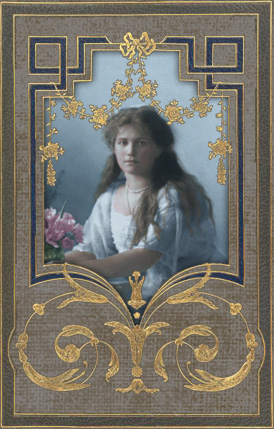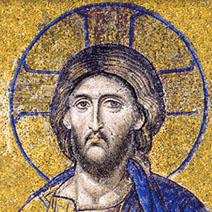Learn how the Deesis mosaic of Christ was created, this page is loaded with details you never knew about each stage of its construction.







CHAPTER 24
ATTACKS ON THE CZAR'S LIFE
MANY false reports have been spread about attempts on the Emperor's life, but, nevertheless, a number of such attempts have been made. I have already spoken of one of them -- the attempt to wreck the Imperial train when he was Czarovitch. Then he was travelling in Japan a fanatic attacked him with a bludgeon. Prince George of Greece, his cousin, who was travelling with him, arrested the blow, but the Emperor got a nasty cut notwithstanding, and was laid up for a few days afterwards. He bears the mark on his forehead to this day. On the anniversary of that day there are thanksgiving services all through Russia, and the day is kept as a holiday throughout Russia.
The first year we were in the Crimea a diabolical plot against the Imperial family was formed, which was happily frustrated by the police. Had it been carried out the whole Court would have been dead and buried.
The grounds of Livadia are open to the public while the Imperial family are away. There was a priest in Yalta who used to like to stroll about among the vineyards and gardens, was exceedingly affable and kind, and showed a great curiosity regarding the daily life of the Emperor and family. He asked about the water supply, and even penetrated into the wood cellar. Before the Imperial family go into any town a police officer is sent to make enquiries regarding all in the place. On this occasion all were easily identified, with the exception of this priest. The police officer telegraphed to the town from which he said he came, and received an answer saying that all the priests belonging to the town were in charge of their churches. No one was absent, nor was anything known of him. One day when he was walking about Livadia the police entered his rooms. They found many in criminating papers, explosives, and even poisons. The explosives were destined for the wood cellar, and the poison for the water supply! It was fortunate for us that the springs in Livadia itself were dry that year, and the water was brought from a distance. The pseudo-priest was arrested and severely punished.
Another attempt was made some time before I went to Russia. The little church in Tsarskoe Selo had been altered, and was to be opened formally by Mass and a Te Deum. Just before divine service began a soldier discovered a bomb under a curtain just behind the Emperor and Empress's places in church. Had it exploded hundreds of persons would have perished.
The author of this horrible crime was a young man of university education. His mother had been early left a widow with this one child, a baby in arms. She was almost penniless when a housemaid in the palace heard of her, was moved with compassion towards her and her baby and gave her some white sewing to do. She interested others in the household in her sad case, and she was generously paid and helped.
She was shortly enabled to start a workroom with apprentices and got on well. When first she began, she used to carry her baby in her arms in and out of the palaces, and afterwards as he got bigger he used to fetch and carry work for her. He thus got to know all the palaces and the guards let him pass without trouble. He was well educated and entered the university. Here he became entangled in a secret society, and, owing to his intimate knowledge of the palaces, was chosen for the dreadful deed. He was arrested and confessed, but would not give the names of his accomplices. He was sent to Siberia for life. The shock of the affair killed his poor mother. The day he was arrested she died, as she said herself, of a broken heart at her son's baseness and ingratitude.
The last attempt on the Emperor was most subtle. A parcel posted at Suez was sent, marked" Private." He received it while seated at tea with the Empress. On being opened it was found to contain a piece of dirty cloth, apparently cut from an old pair of trousers. He exclaimed in wonder at receiving such a curious thing. The Empress seized the tongs, and, taking the dirty cloth in them, sent it from the room. I t was examined and found to be full of plague germs!
Much has lately been written regarding a constitution for Russia. I t has come, but so far as I can judge, the people are not yet ready for it; not one in ten thousand understands the meaning of the word. A person fairly well educated was talking to me one time about the want of liberty in Russia. I told her that she could have very little more liberty in England than she had in Russia, being a woman and obliged to work for her living. I told her that the only liberty one could have was in keeping the laws and following them. She was greatly amazed, and asked me if we had laws in England; I replied, "Certainly; and those who break them speedily find themselves in prison." "What," she exclaimed, "prisons in free England!" She went .on to ask what was forbidden to people in England, and was greatly amazed when I gave her a list. She told me she would not go any more to see those people who had been telling her she was only a slave.
Employers of labour in Russia are in many instances obliged to hire workers from day to day. The Russian workmen do not like to continue to work for a whole week right off; no matter what the press of business may be, they will suddenly announce that they are tired and want a holiday, and go off for two or three days without even finishing the job in hand.
The proprietor of some petroleum wells in the Caucasus told me this story. He had been called upon to settle a strike, and came over from London for the purpose. He saw the men, who submitted a list of claims. Shorter hours, more pay, and a supply of water for drinking purposes, being the chief things. The last item in their list of grievances was, ÒWe do not like an autocratic sovereign." He told them that the water supply was being brought as quickly as possible. He added five kopecks (about one penny-farthing per day) to their wages, and took an hour off the day's work. ÒAnd as for the last thing, he said, 'It shall have my most earnest consideration.' " It was rather puzzling to know what these poor workers expected of their employer, or how they looked to be benefited by a constitution.
It is only a little more than forty years since Alexander II. freed the slaves. It was a noble action, but it might have been more beneficial had it been done in a different manner. It is, of course, very easy to be wise after the event, and in this case no one could foresee the event.
The poor peasants were slaves in the morning and freed men in the evening. All house servants were turned out, field labourers and working men were let loose, and committed the most awful excesses. Many of the house servants returned to their masters and begged to be taken back in their homes. To this day in some households there are old men and women slaves, not receiving any wages, but working for their keep, and receiving clothing from the hands of their masters and mistresses.
In consequence of the extreme misery and famine which fell on the country through the madness of these poor freed slaves, laws were passed, binding the peasant to the land ill which he was born. A peasant could leave his district only after complying with very stringent regulations, and paying a sum of money to the Starosta, or Elder. Two years ago the Emperor proclaimed that these peasants were henceforth free to leave their villages and go where they liked. I do not know that many availed themselves of this permission, however.
Russia has a kind of local government, but until the people are better educated it seems to me that a constitution cannot benefit them much. They are not capable of guiding themselves. The little nursery party in Tsarskoe Selo would be just as well able to arrange their daily life without the aid of "grown-ups" as are the Russians in general.
What they do want, and want badly, is clean hands in the executive.
During the past forty years Russia has made gigantic strides towards civilisation. In the matter of higher education for women she is well abreast of the times. In St. Petersburg and Moscow, and, in fact, all the great centres, there are hundreds of women working as doctors, chemists, dentists, and even finding employment in banks. Russian industries are protected by a high tariff. Buy an article in England and have it sent to you, and you will find that you pay about as much again in Custom House duties as the thing cost in England.
Under this system Russian industries are advancing. Linen is almost as good as that produced in Ireland, but cottons and woollen materials fall very far behind our own productions, which are, however, prohibitory in prices to all with limited means. I have myself seen ordinary English pique sold in Russia for four and sixpence the archine (about three-quarters of a yard), while Russian pique can be had for about tenpence.



